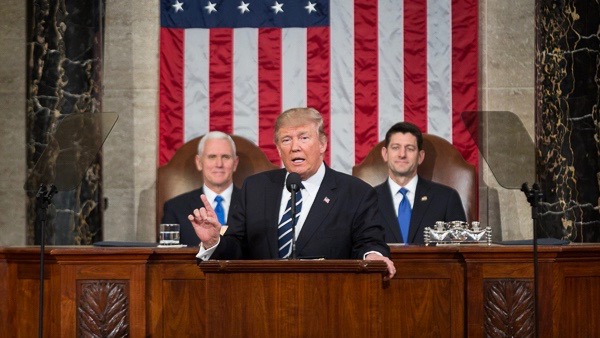WASHINGTON, December 17, 2018 — The uncertainty of looming government shutdown on December 21 will be on full display on Wednesday morning when Congress reconvenes for a last-ditch attempt to tackle the seven remaining must-pass appropriations bills to fund the government for fiscal year 2019.
At the White House, where President Trump said last week that he’d be “proud” to shut down the government should the House and Senate decline to fund his proposed wall along the order with Mexico, administration officials appeared slightly less excited about the prospect of putting roughly 800,000 federal employees out of work days before Christmas.
“We don’t want to shut down the government,” said White House Director of Strategic Communications Mercedes Schlapp. “But we’ve got to find increased spending for border security.”
The president, Schlapp said, is “very focused” on obtaining the $5 billion he says is necessary in order to follow through on building a border wall that he promised, during the presidential campaign, would be paid for by the government of Mexico.
Although the administration may be striking a more optimistic and conciliatory tone leading into Wednesday’s negotiations, one former administration official who is close to Trump told BeltwayBreakfast that the president is not bluffing and remains fully prepared to embrace a shutdown if he does not get what he believes is necessary to secure the southern border.
“He has no problem taking responsibility for a government shutdown if he can’t negotiate with these guys,” said the former official. “They’ll ride it out for as long as it takes.”
Former Trump official says that a shutdown is not likely
Responding to Senate Minority Leader Chuck Schumer, D-N.Y., who on Sunday accused Trump of blocking a bipartisan deal with a “temper tantrum,” the former official was confident in the president’s ability to bend Democrats to his will.
“He can hit the target and he doesn’t blink,” he said. “He’s going to get the other guy to blink.”
Marc Short, who handled the administration’s relations with Capitol Hill until this past summer, acknowledged that the administration has “a lot to figure out” in the coming days. But he discounted the predictions of doom, gloom, and furloughs.
“I’m not convinced we’ll end up there,” he said, referring to the possibility of a shutdown.
Short pointed out that even if negotiations fail and funding lapses, the parts of the government that have been fully funded through the end of fiscal year 2019 are those that normally cause the most headaches. Those include the Department of Defense, and the Department of Health and Human Services that manages Medicare and Social Security.
Short also noted that the partial nature of any potential shutdown could allow for an extended stalemate, in which affected agencies remain closed without much disruption to the general public.
“The average person, I think, will not be impacted,” he said.
One member of Congress doesn’t think a shutdown will be catastrophic
One member of Congress who concurs with Short’s assessment is Rep. Mark Sanford, R-S.C, who noted that the portion of the government that would cease operations in the event of a funding lapse is relatively small in the grand scheme of things.
“You take out interest, you take out entitlement spending, you take out the large [appropriations] bills that have already gone through, we’re talking about only 8 percent of federal spending.”
A shutdown would mean Sanford, who is departing Capitol Hill for the second time after losing his seat to a primary challenger, is leaving the House in a similar condition to how he found it when he arrived in 1995 — in the throes of a shutdown crisis prompted by clashes between then-House Speaker Newt Gingrich, R-Georgia, and President Bill Clinton.
Sanford said the root causes of the 1995 funding lapse and the shorter ones seen under President Trump are the same.
“Strongly held opinion and disagreement leads to an impasse and a shutdown,” he said.
He acknowledged a major difference between the past and present situations, noting that in 1995, Republicans had a Democratic president to content with, whereas now they control both the executive and legislative branches.
“Typically you don’t see shutdowns on the same team, it’s usually Republicans versus Democrats that leads to a shutdown,” Sanford said.
“It’s certainly curious, odd, and different that it comes this way, but we are where we are.”

